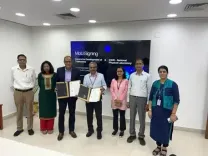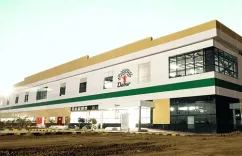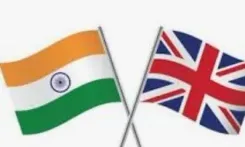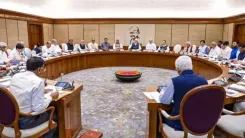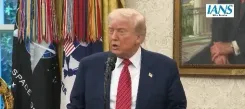How is India's 'SVAMITVA' Scheme Transforming Global Land Governance?

Synopsis
At the 'World Bank Land Conference 2025,' India showcased its 'SVAMITVA' scheme as a model for inclusive land governance, highlighting how it empowers rural citizens and boosts economic opportunities. This initiative represents a significant step towards legal recognition and dignity for millions.
Key Takeaways
- SVAMITVA scheme unlocks $1.16 trillion in assets.
- Legal titles enhance access to credit for rural families.
- India emphasizes technology-driven land governance.
- Global interest in India's inclusive model is growing.
- Community involvement is crucial for effective reforms.
New Delhi, May 7 (NationPress) India prominently showcased its leadership at the distinguished 'World Bank Land Conference 2025' in Washington, DC, emphasizing its role in inclusive land governance and grassroots empowerment.
During the plenary session as a 'Country Champion', Vivek Bharadwaj, Secretary of the Ministry of Panchayati Raj, articulated India's advancements in land rights, tenure reforms, and technology-driven spatial planning, as stated by the Ministry of Panchayati Raj on Wednesday.
Under the guidance of Prime Minister Narendra Modi, India's innovative 'SVAMITVA' scheme (Survey of Villages and Mapping with Improvised Technology in Village Areas) has emerged as a groundbreaking initiative in rural land governance.
Bharadwaj highlighted that India has mapped 68,000 square kilometers of rural land through 'SVAMITVA', unlocking $1.16 trillion in assets, thus providing millions of rural families with legal titles, dignity, and access to credit and opportunities.
He shared inspiring stories, such as a dairy farmer from Madhya Pradesh who expanded his business and a mother in Rajasthan who financed her daughter’s education abroad, illustrating how land ownership translates into true empowerment.
Bharadwaj offered valuable insights into the journey of the scheme, which included engaging states, revising state laws, and establishing essential technological frameworks like Continuously Operating Reference Stations (CORS) for precise drone-based mapping. He pointed out the necessity of strategic cooperation and community engagement in India’s federal structure to implement reforms nationwide.
The special event, titled “Securing Land Rights for a Billion People,” was aimed at amplifying India’s model of inclusive and technology-driven land governance.
The session, led by the Ministry of Panchayati Raj, commenced with remarks from Dr. Klaus W. Deininger, Lead Economist at the World Bank, followed by an introduction by Somik V Lall, Senior Advisor at DECVP, World Bank.
The event focused on the design, impact, and scalability of the 'SVAMITVA' scheme, featuring a presentation by Vivek Bharadwaj. An interactive Q&A session was scheduled, reflecting the growing global interest in India’s transformative approach to rural land governance.
All delegates at the 'World Bank Land Conference 2025', including advisors and senior advisors to seven executive directors from regions spanning Africa, Latin America and the Caribbean, Central Asia, South Asia, and Southeast Asia, attended the side event, providing a valuable opportunity for regional dialogue and exchange.
The event aimed to create a focused platform for discussing the implementation strategies and transformative advantages of the SVAMITVA scheme with countries possessing similar land administration frameworks.
The goal is to explore collaborative opportunities, enabling the Ministry of Panchayati Raj to assist and partner with these nations in adopting and customizing similar models in their unique contexts.
On Thursday, the spotlight shifted to 'Gram Manchitra' (India’s advanced GIS-based spatial planning platform). Alok Prem Nagar, Joint Secretary of the Ministry of Panchayati Raj, presented how this platform supports spatially informed decision-making at the Panchayat level, demonstrating the fusion of cutting-edge technology with grassroots governance to cultivate sustainable, resilient, and self-sufficient villages.
By participating in the 'World Bank Land Conference 2025', India has established itself as a global thought leader in land tenure reforms, rural development, and inclusive governance, showcasing that a data-driven, people-centric approach can effectively resolve long-standing land insecurity and usher in a new era of legal recognition, dignity, and prosperity for rural citizens.

